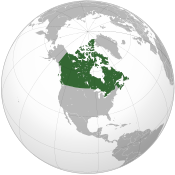Ice shelf breaks free in Canadian Arctic
Friday, December 29, 2006
The Ayles ice shelf, which is more than 11,000 football fields in size and is located just south of the North Pole, has broken free in the Canadian Arctic. Scientists say that global warming has played a "major" role in the break.
The entire 41 square miles of the shelf broke away from Ellesmere Island at least 16 months ago, and the break was discovered when a satellite took pictures of the region recently.
"This is a dramatic and disturbing event. It shows that we are losing remarkable features of the Canadian North that have been in place for many thousands of years. We are crossing climate thresholds, and these may signal the onset of accelerated change ahead," said Warwick Vincent, a Laval University scientist who studies conditions in the Arctic.
Higher temperatures are believed to have played a significant role in the break, and all 6 shelves in the Canadian Arctic have become at least 90% smaller since they were discovered in the early 1900's.
"It [the break] is consistent with climate change. We aren't able to connect all of the dots, but unusually warm temperatures definitely played a major role," added Vincent.
Seismographs detected the break and collapse of the shelf in August of 2005. The short amount of time it took for the event to occur has come as a surprise to scientists.
"What surprised us was how quickly it happened. Even 10 years ago scientists assumed that when global warming changes occur that it would happen gradually, so that perhaps we expected these ice shelves just to melt away quite slowly. It's pretty alarming," said head of the University of Ottawa's global ice lab, Luke Copland.
Related news
- "Polar bears to become "threatened" species" — Wikinews, December 27, 2006
Sources
- "Huge Arctic ice break discovered" — BBC News Online, December 29, 2006
- "Arctic ice shelf collapse poses risk: expert" — CBC News, December 28, 2006
- Rob Gillies. "Ice Mass Snaps Free From Canada's Arctic" — ABC News, December 29, 2006
- "Ancient ice shelf breaks free from Canadian Arctic" — CNN, December 29, 2006



